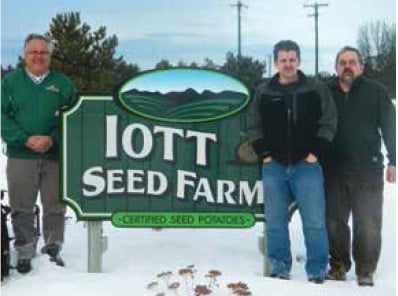Dennis and Greg Iott of Iott Seed Farms operate a 1,350-acre operation producing seed potatoes for commercial chip growers and wheat, with remaining acres in rye, sorghum and sudangrass or other cover crops as part of a three year rotation. Their retailer is Dale Dosenberry of Wilbur Ellis.“Quality and uniformity are critical to a successful seed potato crop,” Dennis explains. “Nobody wants big seed potatoes. There’s the same number of eyes on large and small ones. We strive for a large number of small potatoes. If there’s a limiting nutrient to a potato plant, it’ll stop growing. Plus, we have a short growing season, so we don’t have time to waste.”
These are just a few reasons, combined with a passion for modern agriculture practices, why the Iotts apply the best nutrient stewardship management practices available. They were nominated by Dale Dosenberry, technical sales representative, with Wilbur-Ellis Company in Edmore, Mich. He’s been working with Iotts for more than 32 years.
“This long business relationship allows me the perspective of knowing what the issues on the farm are,” Dosenberry says. “You also know what type of farmer your customer is, what he expects from his crop and what he wants to produce for his customers.”
Results demonstrate the 4R principles are working well. Over the past four years, uniformity of yields has improved every year, consistently reaching the top of yield goals on all acres. Previously, there could be 15 percent to 20 percent variability year to year. In addition, their focus on properly balancing soil nutrients has greatly minimized potato scab, a disease that can harm the crop and profits.
